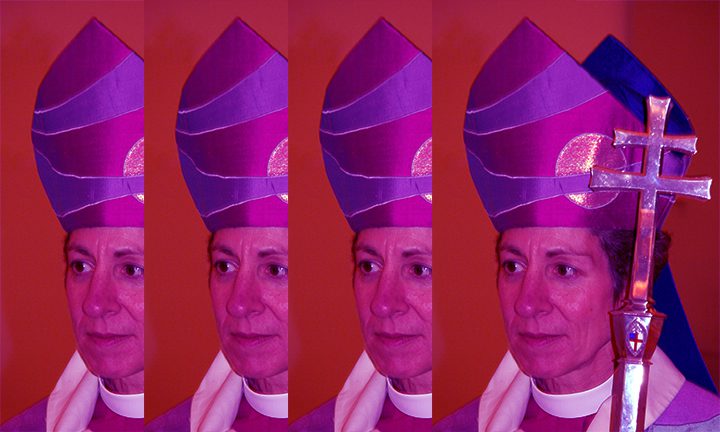
When the topic of ordaining Mormon women comes up, one of the most common responses from top Church leadership as well as more orthodox members is that Mormon women are, in an overwhelming majority, against being ordained. Personally, I’ve heard a number of reasons for being against ordination, ranging from pseudo-science theories about female vs. male brains (theories about the brain that have been debunked), to insulting complaints that men would slack off if they weren’t the only people ordained, to the bizarre circular logic that men need the priesthood in order to be the head of the household, and that they’re the head of the household because they hold the priesthood. Yeah, even as a preteen I didn’t put any stock in that last one, and as a married woman I put even less stock in it.
Mormon women say they would welcome ordination – if the opportunity came through prophetic revelation.
The explanation that Mormon women don’t even want ordination is problematic for reasons I’ve discussed before. But it’s also inaccurate. While past surveys have demonstrated that the majority of Mormon women will say they oppose female ordination, those surveys failed to separate how Mormon women feel about female ordination from how Mormon women feel about following the prophet. If you ask Mormon women how they feel about something that is currently taught by the men they view as prophets, seers, and revelators, you may get a response that has nothing to do with the policy itself and everything to do with their loyalty to leaders. And that is exactly what was revealed when a recent survey reframed the question by asking Mormon women how they would respond if the First Presidency of the Church and Quorum of the Twelve received a revelation allowing female ordination. An overwhelming majority said they would support it. And the researchers were very careful to get the surveys out to a wide array of women, including those involved in the more conservative group, Mormon Women Stand (the Frozen-fearing blogger, Skaggs, reportedly is “not pleased” by the results of the survey.)
Of course, the survey still doesn’t tell us how Mormon women feel about female ordination outside of the context of modern prophetic revelation. But perhaps there’s no way of knowing that. We could ask Mormon women “would you support female ordination if President Monson gave you the choice?” But even then, perhaps women would say, “Yes, I would support ordination” because Mormons value volunteering for service opportunities. And perhaps other women would say, “No, I absolutely would not support it,” because they are showing support for the process of prophetic revelation and would want the answer to come from President Monson himself.
What the survey does make clear is that top Church leadership should probably take members’ support of existing policies with a grain of salt. It may not be support of the policy, but rather loyalty to the leaders. And the more that Church acts of discipline against dissenters take place, the more likely it is that, even in a survey designed by Church leaders who want our honest opinions, we will struggle to be completely honest with ourselves and thus with them.
Our desire to attain righteous attributes can obscure even our ability to tell God, in the privacy of prayer, that we’re furious with a family member or envious of a co-worker. And God already knows what we’re feeling – he’s not going to think less of us just because we put our thoughts into words. How much more difficult is it to be honest, even in the privacy of a survey, when we know our responses will be read by leaders who are inspired but also imperfect? But our leaders need to know how we truly feel. Changes made at the global level are often informed by experiences of individual members, as blogger and writer Margaret Young has pointed out – even the Church’s decision to lift the temple and priesthood ban in 1978 was influenced by conversations with black members who were heartbroken as they watched their children leave a church where they felt unwelcome. The Church is led by inspiration, and inspiration is usually influenced by information. If it weren’t, why would the Church teach us to study a situation as part of the process of personal revelation?
I’m not saying we should hold a rally in Salt Lake to show dissent or that we should try to publicly rebuke leaders in the style of Denver Snuffer (please, for the love of all that’s good, do not follow the example of Snuffer in any regard). But we need to be comfortable with the knowledge that our leaders are not demigods, and perhaps we need to take it at face value if a survey asks our feelings toward current policies, especially if the survey comes from the Church itself (to be clear, the survey Peggy Fletcher reported on today came from Mormon-affiliated academics, not the Church). If a survey from the Church asks how you feel about a current policy, try to assume that the First Presidency and Quorum of the 12 truly are asking about that policy and not about your loyalty to them as leaders. Even with a secular survey, try to remember that Church leaders will probably take note of the survey and that their prayers may be influenced by what we indicate we think.
And if you hear a fellow Mormon express disagreement with a current policy, please do me a favor and try not to assume they’re disloyal to leaders or that they lack a testimony of the Gospel. Heck, we’ve probably all broken minor Church policies without even realizing it – perhaps by including a check for tithing with the fast offering that the deacons collect, or by bringing live flowers into the chapel or cultural hall (my husband and I broke that policy at all 3 of our receptions/ open houses). At the end of the day, the information we share with Church leaders matters. And if female ordination during mortality is something God would welcome – and I’m not about to assume whether it is – then our continued insistence, as Mormon women, that we oppose female ordination, may well be halting the progress of our Heavenly Parents’ work.











